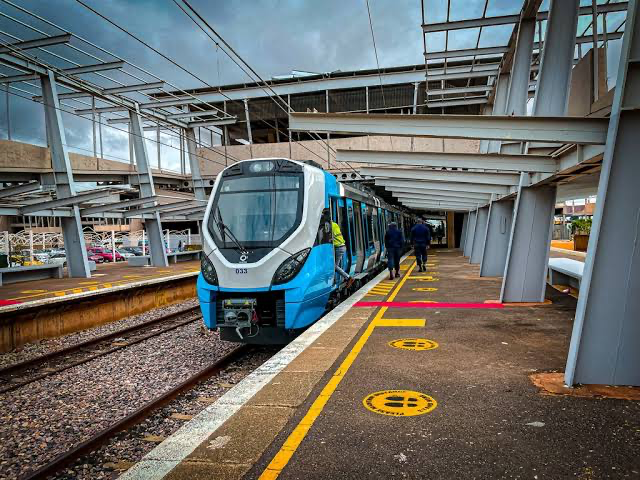The Passenger Rail Agency of South Africa (PRASA) has made significant progress in modernizing its rail services by introducing energy-efficient trains, which is part of a broader strategy to improve its operations and sustainability. Recently, the Gibela Rail Transport Consortium, a joint venture between French rail company Alstom and South Africa’s Ubumbano Rail, unveiled the 200th high-tech Electric Multiple Unit (EMU), marking a crucial milestone. This achievement is part of a larger R51 billion contract aimed at delivering 600 modern trains to enhance PRASA’s fleet with greener, more efficient rail solutions.
The X’trapolis MEGA commuter trains are produced in a R1 billion factory in Ekurhuleni, Gauteng, showcasing industrial advancement and environmental consciousness in South Africa’s rail sector. These trains are designed to fit South Africa’s unique 1.067m gauge rail tracks, weighing 220 tonnes and stretching 131 meters in length. Notably, these units are made of stainless steel that is 30% lighter than traditional carbon steel, significantly reducing energy consumption and lowering greenhouse gas emissions. The sustainable design does not end with energy efficiency; 99% of the train components are recoverable, and 96% are recyclable, minimizing the environmental impact at the end of their lifecycle.
Despite these advancements, PRASA has faced significant challenges, notably from vandalism and theft, particularly during the COVID-19 pandemic lockdowns. This adversity has affected approximately 50% of PRASA’s 2,228 kilometers of rail tracks across South Africa. However, the agency has made commendable progress in restoring services. Over the past financial year, PRASA has reinstated 31 of its 40 national lines and refurbished more than 263 of the 463 stations that had been vandalized.
The restoration efforts extend beyond mere repairs. PRASA’s strategy involves significant economic injections and job creation, which have been pivotal in the post-pandemic recovery phase. In the last year alone, PRASA’s initiatives have funneled over R3.6 billion into the economy, creating more than 6,000 job opportunities, and engaging 211 small, medium, and micro-sized enterprises (SMMEs). This has not only revitalized the rail services but also contributed to community development and empowerment.
Looking ahead, PRASA aims to continue enhancing its services, with a goal to improve train punctuality from 63% in 2019/20 to 80% in 2023/24. This aligns with Alstom’s future objectives, which include increasing the production rate to 62 X’trapolis Mega trains per annum by 2025, alongside boosting the production of up to 50 locomotives a year. This ambitious target will likely reinforce the rail network’s capacity to support sustainable urban mobility, significantly reducing carbon emissions compared to conventional road transport.
PRASA’s integration of energy-efficient trains within its operational framework is a monumental step toward transforming public transport in South Africa. By focusing on sustainability, safety, and efficiency, PRASA is not only enhancing commuter experiences but also contributing to the broader environmental goals of reducing urban carbon footprints. As these initiatives continue to unfold, the long-term impacts on South Africa’s urban development and environmental sustainability are expected to be profound, setting a benchmark for public transport systems globally.
Source: ESI Africa



